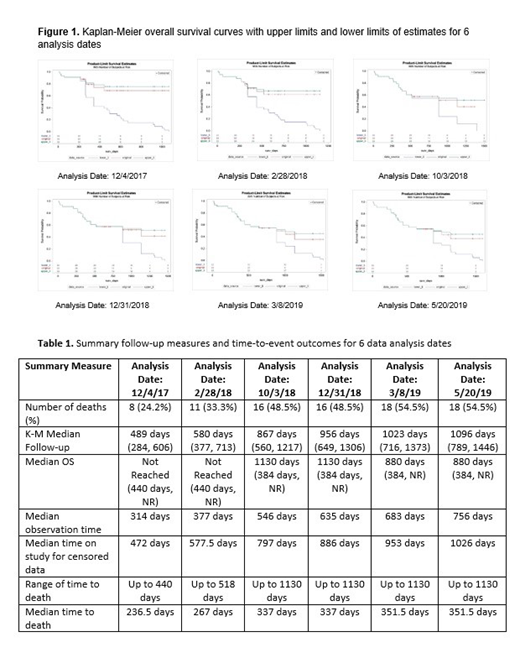Background:
Follow-up time in clinical trials must leverage conflicting aims. To ensure patient safety, investigators often assess toxicity and efficacy endpoints at various times throughout a trial. Yet accurate analysis requires stable estimates of time-to-event outcomes, which can require longer follow-up than is observed in interim analyses. While median follow-up is routinely reported in clinical trials, the stability of time-to-event estimates and their relationship to follow-up times are rarely discussed. However, the potential follow-up of study participants who are censored in a clinical trial can impact time-to-event estimates (Betensky 2015).
Methods:
A clinical trial of venetoclax + azacitidine in 33 newly diagnosed older patients with AML was conducted at our institution and is described in detail elsewhere (Pollyea 2018). Trial data consisting of follow-up from January 2015 through February 2018 established promising results (overall response rate = 91%; median response duration, progression-free survival, and overall survival (OS) were not yet reached). Due to ongoing interest in median time-to-event patient outcomes that were not reached and thus could not be reported at the time of publication, the data have been re-analyzed on repeated occasions as follow-up has continued, with OS of particular interest.
Median follow-up was calculated using the reverse Kaplan-Meier method. Median OS was calculated using Kaplan-Meier product limit estimates. Analysis of trial data has occurred at 6 different censoring time points: December 4, 2017; February 28, 2018; October 3, 2018; December 31, 2018; March 8, 2019; and May 20, 2019. Upper and lower limits of the Kaplan-Meier OS estimate were calculated to explore the stability of OS estimates over time (Betensky 2015). Analyses were performed using SAS version 9.4 (SAS Institute).
Results:
Median OS was not reached until analysis was conducted as of October 3, 2018. At this analysis the median OS (1130 days) exceeded the median follow-up time (867 days). This phenomenon also occurred for data censored on December 31, 2018, with the median OS (1130 days) also exceeding the median follow-up time (956 days). In the most recent two analyses of the data (March 8, 2019 and May 20, 2019), the median OS settled at a consistent value (880 days) that did not exceed the median follow-up times (1023 days and 1096 days, respectively). Exploration of the stability of OS estimates revealed that a single patient enrolled early in the study and died after 1130 days of follow-up skewed the median OS estimate upward.
Conclusions:
Interest in our clinical trial results motivated numerous follow-up analyses of our data. As such, we encountered a peculiar result in which median OS exceeded median follow-up. In investigating the stability of the OS K-M estimates, a single patient's study data was found to skew results in these instances. Removal of this patient's data in these instances (when the relationship between median follow-up and median OS suggest estimate instability) results in a median OS consistent with subsequent analyses at later censoring dates (880 days for the modified analysis). We therefore conclude that time-to-event estimate stability is informative and should be incorporated into survival analysis of clinical trial data.
Pollyea:Takeda: Consultancy, Membership on an entity's Board of Directors or advisory committees; Agios: Consultancy, Membership on an entity's Board of Directors or advisory committees; Abbvie: Consultancy, Membership on an entity's Board of Directors or advisory committees, Research Funding; Astellas: Consultancy, Membership on an entity's Board of Directors or advisory committees; Pfizer: Consultancy, Membership on an entity's Board of Directors or advisory committees, Research Funding; Forty-Seven: Consultancy, Membership on an entity's Board of Directors or advisory committees; Celyad: Consultancy, Membership on an entity's Board of Directors or advisory committees; Janssen: Consultancy, Membership on an entity's Board of Directors or advisory committees; Diachii Sankyo: Consultancy, Membership on an entity's Board of Directors or advisory committees; Celgene: Consultancy, Membership on an entity's Board of Directors or advisory committees; Gilead: Consultancy, Membership on an entity's Board of Directors or advisory committees.
Author notes
Asterisk with author names denotes non-ASH members.


This feature is available to Subscribers Only
Sign In or Create an Account Close Modal